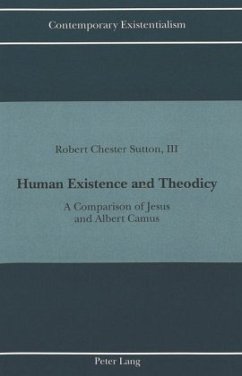This fascinating book critically utilizes scholarly material to explore how Jesus and Albert Camus responded to the existential realities of evil. An interdisciplinary work, it charts a course through complex issues and vast amounts of scholarly literature employing a cogent and eloquent prose style. By way of literary analysis, it demonstrates that the immediate social contexts, characterized by rapid social change and symbolic disintegration, are evidenced in both the forms and content of Jesus' parables and Camus' writings. This analysis leads to the insight that Jesus and Camus rejected the prevailing moralistic and religious ways of explaining evil in favor of an "artistic" response to this existential problem.
"Writing in the tradition of Stanley Romaine Hopper, Amos Wilder, Nathan Scott, and Paul Tillich, Dr. Robert C. Sutton has had the wonderful audacity to argue a comparison of Jesus of Nazareth and Albert Camus. The achievement is all the more crucially important in that it addresses the question of the persistence of evil in our world, of why the innocent suffer. Most surprising of all is that the author's perspective is affirmative of life without being unrealistic¿" (David L. Miller, Syracuse University)
"With his unlikely coupling of Jesus and Camus, Sutton opens up a fresh horizon for theological reconstruction at the end of modernity. A revitalizing honesty replaces stale patterns of transcendence, while the apocalyptic tradition, turned existential in his reading, kindles courage for struggle and change in the present tense. A probing, imaginative encounter with subtextual possibilities in western theodicy." (Catherine Keller, Drew Theological School)
"With his unlikely coupling of Jesus and Camus, Sutton opens up a fresh horizon for theological reconstruction at the end of modernity. A revitalizing honesty replaces stale patterns of transcendence, while the apocalyptic tradition, turned existential in his reading, kindles courage for struggle and change in the present tense. A probing, imaginative encounter with subtextual possibilities in western theodicy." (Catherine Keller, Drew Theological School)

